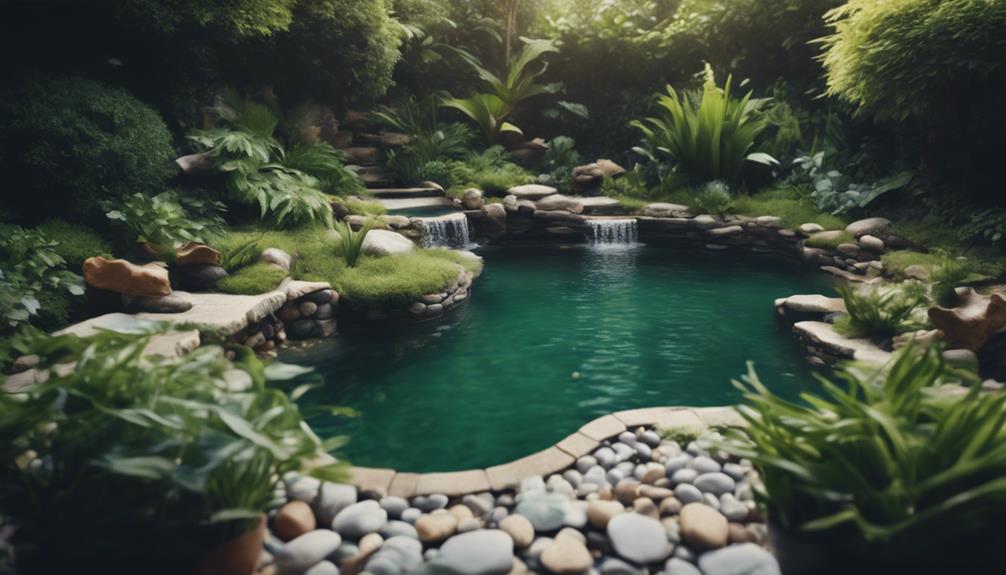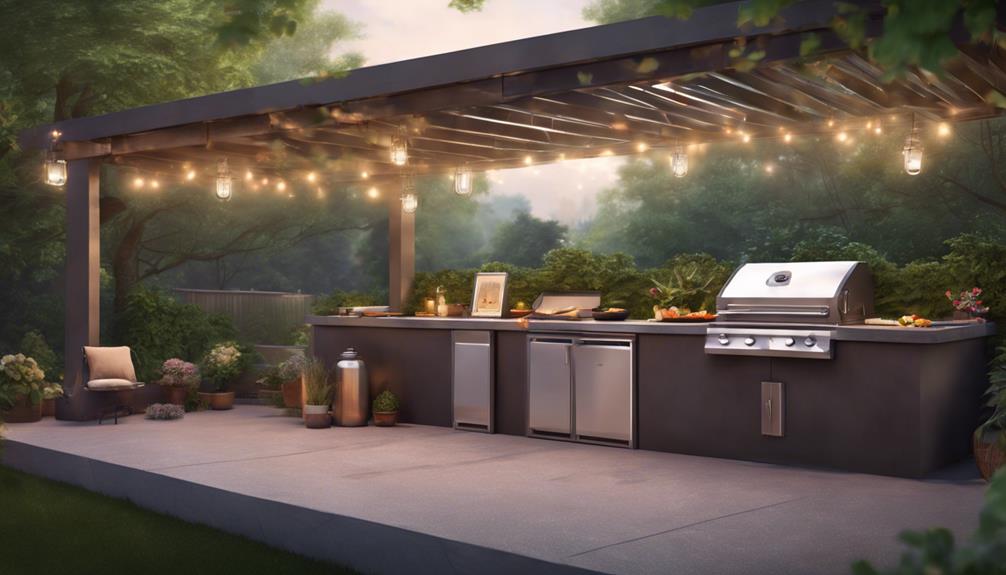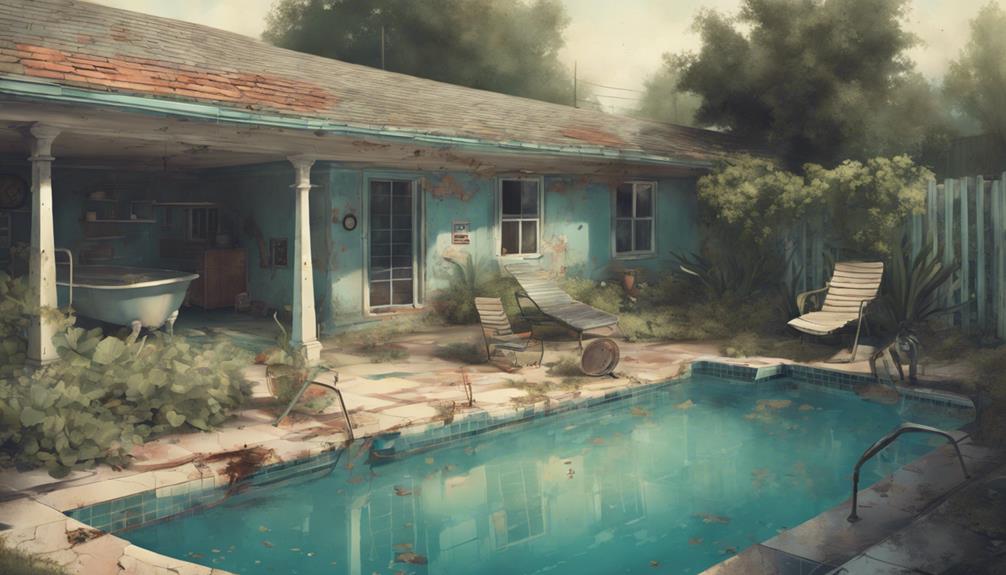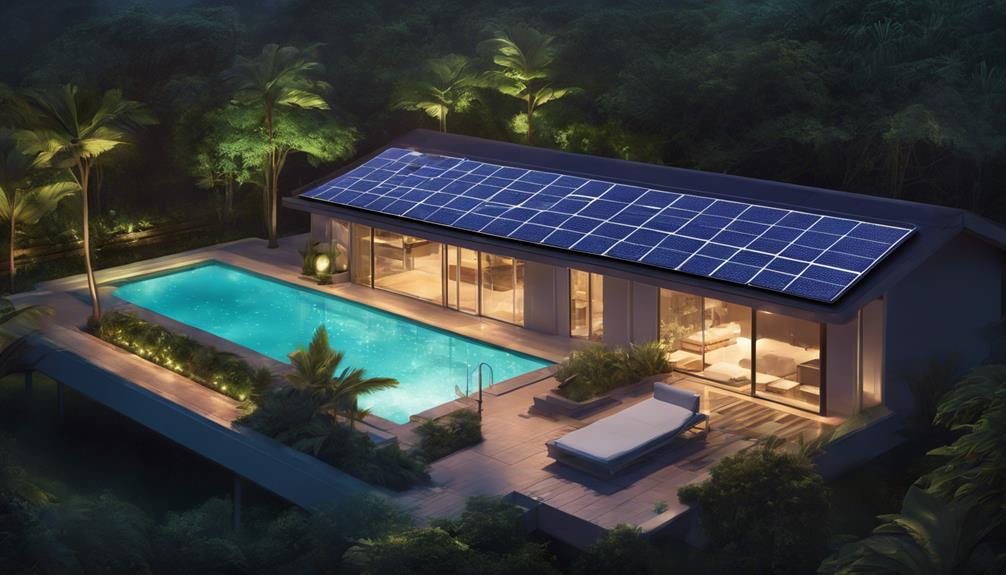When it comes to swimming pool materials, you have a variety to choose from. Concrete offers customization but requires maintenance. Fiberglass boasts low maintenance and durability. Vinyl is affordable but may need repairs. Tiles provide durability and customization but also need upkeep. Natural pools utilize plants for filtration, requiring more care. Each material has its pros and cons, so consider your preferences carefully. To learn more about the advantages and details of each option, there’s much more to explore.
Key Takeaways
- Concrete pools offer customizable designs but require regular maintenance for longevity.
- Fiberglass pools are durable with low maintenance needs and a smooth, long-lasting surface.
- Vinyl pools provide versatility and quick installation at a lower initial cost.
- Tile pools offer durability with customizable designs but require meticulous cleaning for upkeep.
- Each pool material has unique characteristics to consider for customization, maintenance, and budget.
Concrete Pools
Concrete pools are a popular choice for homeowners seeking a customizable and durable swimming pool option. These pools, often constructed with ceramic tiles or pool liner coating, offer a customizable design that can complement any backyard. When hiring a pool builder to install a concrete pool, be prepared for a construction timeline that can range from weeks to months due to their intricate nature. While concrete pools are known for their durability and longevity, it's important to guarantee proper sealing during construction to prevent potential leaking issues.
To maintain the impressive appearance and structural integrity of your concrete pool, regular pool cleaning is vital. This includes tasks such as pH corrections and algae cleaning to keep the water clear and inviting. Remember that well-maintained concrete pools not only provide a relaxing retreat in the summer but also add value to your property.
Fiberglass Pools

Fiberglass pools boast exceptional durability, thanks to their smooth, non-porous surface that resists algae growth.
The installation process for fiberglass pools is hassle-free, given their pre-manufactured structures that streamline the setup.
When it comes to maintenance, fiberglass pools are a low-maintenance option compared to other materials, offering you more time to enjoy your pool and less time on upkeep.
Durability of Fiberglass
The durability of fiberglass pools is often praised for their ability to withstand ground movement due to their flexible nature. Fiberglass pools feature a gel coat surface that's non-porous, making them highly resistant to algae growth compared to other pool materials.
This durability is further enhanced by the pools' smooth surface, which is gentle on the skin and eliminates the need for frequent resurfacing, a common requirement for concrete pools. One of the key advantages of fiberglass pools is their longevity, with an average lifespan exceeding 25 years.
This extended lifespan not only offers long-term enjoyment but also provides a cost-effective investment in comparison to other pool types. Additionally, fiberglass pools are known for their ease of maintenance, requiring fewer chemicals for upkeep, which simplifies the overall pool care routine.
With their combination of durability, longevity, and low maintenance requirements, fiberglass pools stand out as a reliable and long-lasting choice for your swimming pool needs.
Installation Process Simplicity
With their one-piece structure and pre-manufactured design, fiberglass pools offer a streamlined and rapid installation process that sets them apart from other pool materials. The quick installation of fiberglass pools is a major draw for many homeowners. Thanks to their pre-fabricated nature, these pools can typically be installed in as little as a few days to a week, greatly reducing construction time and labor costs.
The one-piece structure of fiberglass pools plays an important role in simplifying the installation process, as it eliminates the need for extensive on-site construction. This simplicity not only saves time but also guarantees a more efficient and hassle-free installation experience. If you're looking for a swimming pool material that offers quick installation without compromising on quality, fiberglass pools are an excellent choice.
Their ease of installation makes them an attractive option for those seeking a faster turnaround time for their pool project.
Maintenance Requirements for Fiberglass
When maintaining fiberglass pools, you'll find that their non-porous surface greatly reduces the need for frequent algae control. Unlike porous surfaces that can harbor algae, the smooth finish of fiberglass pools makes them resistant to algae growth, simplifying maintenance tasks.
This feature not only saves you time but also minimizes the amount of chemicals required to keep your pool clean. The non-porous nature of fiberglass pools also means that they require fewer chemical adjustments to maintain proper water balance. You'll spend less time worrying about pH levels since the material of fiberglass pools doesn't have a substantial impact on the water chemistry.
Vinyl Pools

Crafted from polypropylene plates with outer ribbing, vinyl pools are known for their durable and customizable designs. These pools, often referred to as vinyl liner pools, offer a smooth surface that feels gentle on your skin, providing a comfortable swimming experience. One of the key advantages of vinyl pools is the ability to choose from a wide range of designs and patterns, allowing you to personalize your pool to suit your preferences.
Here is a table summarizing some pros and cons of vinyl pools:
| Pros | Cons |
|---|---|
| Customizable designs | Liner replacement may be required |
| Quick installation | Lower initial cost compared to others |
| Gentle on the skin | |
| Durable | |
| Comfortable to touch |
Vinyl pools are a popular choice due to their versatility, comfort, and relatively quick installation process. While they may require occasional maintenance like liner replacements, their customizable nature makes them an attractive option for many homeowners looking to create their dream pool.
Tile Pools

When considering tile pools, you'll find a range of durable options available.
The versatility in design allows for a customized look that suits your preferences.
Additionally, maintenance considerations play a key role in keeping your tile pool looking pristine.
Durable Tile Options
What makes tile pools a durable choice for your swimming pool surface?
Tile pools, such as those made of mosaic or ceramic tiles, offer exceptional durability and longevity.
Here are three reasons why tile pools are a top choice for those seeking a durable swimming pool surface:
- Resilient Material:
Mosaic and ceramic tiles are known for their robustness, making them resistant to wear and tear over time. This durability guarantees that your pool surface remains intact even with frequent use and exposure to the elements.
- Algae Resistance:
The smooth surface of tile pools makes it difficult for algae to adhere and grow, reducing the chances of unsightly algae blooms. This resistance to algae growth helps maintain the cleanliness and aesthetics of your pool.
- Maintenance:
While grout lines in tile pools require regular cleaning to uphold their appearance, this upkeep is a small price to pay for the longevity and visual appeal that tile surfaces provide. Regular maintenance ensures that your tile pool continues to shine for years to come.
Design Versatility Advantages
Tile pools offer an array of design versatility advantages, allowing you to customize your pool with a wide selection of colors, patterns, and finishes. When it comes to swimming pools, the design possibilities with tile pools are practically endless.
Mosaic tiles can be used to create intricate and artistic designs, elevating the pool's aesthetic appeal to a luxurious level. Additionally, the durability and resistance to fading of tile pools make them a long-lasting and attractive choice for pool surfaces.
You can further enhance the visual impact of your pool by customizing the grout lines in colors that complement or contrast with the tiles. The smooth and non-porous surface of tile pools not only adds to their visual appeal but also makes them easy to clean and maintain.
This feature reduces the risk of algae growth and staining, ensuring that your pool stays beautiful for years to come.
Maintenance Considerations Discussed
Regular cleaning of the grout lines in tile pools is essential to prevent grime buildup and maintain the pool's aesthetics.
When it comes to maintaining your tile pool, here are some key considerations to keep in mind:
- Intensive Cleaning: The porous joints in tile pools can harbor dirt and bacteria, requiring thorough and regular cleaning to guarantee a hygienic environment for swimmers.
- Meticulous Maintenance for Mosaic Pools: If you have a mosaic tile pool, intricate designs demand meticulous attention to detail during maintenance to preserve their beauty and uniqueness.
- Care for Pool Liners: While tile pools offer visual appeal, the pool liners can be vulnerable to damage and leaks if not properly cared for. Regular inspections and prompt repairs are essential to prevent costly issues down the line.
Natural Pools

Natural pools provide a chemical-free water treatment solution for eco-conscious homeowners, requiring a regeneration zone for natural filtration. Unlike traditional pools that rely on chlorine and other chemicals, natural pools utilize plants and beneficial bacteria to keep the water clean and clear.
The regeneration zone, typically located adjacent to the swimming area, acts as a natural filter where aquatic plants absorb nutrients and purify the water.
One of the benefits of natural pools is their seamless integration with the surrounding landscape. These pools create a more organic look, blending harmoniously with gardens and natural elements.
However, it's important to note that natural pools require more maintenance compared to traditional ones. Regular upkeep of the regeneration zone and monitoring water quality are vital to ensure the pool remains healthy and balanced.
Comparing Popular Pool Materials

When considering the materials for your swimming pool, it's essential to compare popular options such as concrete, fiberglass, vinyl, and other types to determine the best fit for your needs.
Here are some key points to help you make an informed decision:
- Concrete Pool: Offers custom shapes and designs but requires regular maintenance to prevent cracking.
- Fiberglass Pool: Features a smooth surface gentle on skin and low maintenance due to its non-porous nature.
- Vinyl Pool: Cost-effective with a comfortable touch, but may require more frequent repairs and replacements compared to other materials.
Each pool material has its advantages and considerations. Concrete pools provide flexibility in design but need upkeep, while fiberglass pools are easy to maintain but offer fewer customization options. Vinyl pools are budget-friendly but may entail more repairs.
Consider your priorities regarding customization, maintenance, and budget when selecting the best pool material for your backyard oasis.
Frequently Asked Questions
What Is the Longest Lasting Pool Material?
For the longest lasting pool material, concrete is your top pick. With proper care, it can endure for decades. Though it may need some resurfacing now and then, regular maintenance can help it last even longer.
What Is the Best Material for an Inground Pool?
For an inground pool, concrete stands out as the best choice. Its durability and customizability make it a popular option among homeowners. You'll love the strength and versatility of a concrete pool in your backyard oasis.
What Is the Longest Lasting Pool Finish?
For the longest lasting pool finish, go for tile finishes like ceramic or glass tiles. With proper care, they can endure for over 20 years. Choose durability and longevity to enjoy your swimming pool for decades.
What Is the Cheapest Material to Put Around a Pool?
If you're looking to save some cash, concrete is your best bet for pool decking. It's budget-friendly, ranging from $6 to $15 per square foot. So, go ahead and jump in without breaking the bank!
What Material is Best for Achieving the Desired Color in a Swimming Pool?
When it comes to achieving the desired swimming pool water color truth, the material used is crucial. For a clear blue hue, white plaster is popular. For a darker, more natural look, pebble finishes work well. And for a range of colors, quartz aggregates are a versatile option.
Which Swimming Pool Material Offers the Most Durable Finish?
When considering durable swimming pool finishes, many experts recommend choosing plaster as the most durable material. While there are other options such as tiles and aggregates, plaster offers a smooth and long-lasting finish that can withstand the elements and regular use.
What Materials Are Used for the Construction of Rare and Unique Swimming Pools?
When it comes to creating rare swimming pools discovery, a variety of materials can be used for construction. Unique pools may utilize custom mosaic tiles, gemstone accents, or even non-traditional materials like glass or acrylic. Specialized craftsmanship and innovative designs contribute to the creation of truly one-of-a-kind swimming pools.
What Material Is Used for the Construction of Rare Swimming Pools?
The construction of most rare swimming pools often involves the use of high-quality materials such as volcanic rock, glass tiles, and natural stone. These materials not only contribute to the unique and luxurious appearance of the pools but also ensure durability and longevity, making them standout features in any setting.
What are the benefits of using rare swimming pool materials compared to popular ones?
When it comes to building a swimming pool, using rare materials can bring unique and luxurious benefits compared to popular options. The most rare swimming pools stand out with their exceptional aesthetic, durability, and low maintenance requirements. These materials can elevate the overall look and feel of a pool, offering a one-of-a-kind experience for homeowners.
Conclusion
When it comes to choosing the right material for your swimming pool, consider factors like durability, maintenance, and cost.
While concrete pools offer customization options, fiberglass pools are known for their quick installation.
Vinyl pools are budget-friendly, while tile pools provide a luxurious look.
Natural pools offer an eco-friendly alternative.
Each material has its pros and cons, so make sure to weigh them carefully before making your decision. Remember, the best material is the one that fits your needs and lifestyle perfectly.









